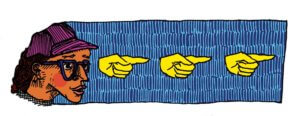This year I worked with a team to put together the Feminist Leadership Conference (FLC) that was held on March 2 and 3. We started with one goal: making feminism on campus more intersectional. But how? All of us were white women, so how could we ensure that diverse voices were heard? We worked to create a platform where various voices would be represented for all of us to learn from. The theme of allyship followed naturally. It sounds idealistic, and to an extent it was, but putting idealism into practice is not a simple task. How to represent without tokenizing? How to organize without dictating? How to prioritize speakers, activities, discussions, when there are so many interlocking oppressions present that deserve our attention? Most importantly, how to make this conference a truly meaningful learning experience and not simply a checking of boxes?
The process of organizing helped me recognize my own problematic behaviours and misconceptions. I had to accept that some of my ideas would be criticized. A human library, for example, could have been a valuable experience but could also be seen as tokenizing and a logistical nightmare. I had to keep putting ideas out there anyway, and eventually the FLC came together. We decided to centre Indigeneity by bringing in two Indigenous speakers, because of recent events including the Missing and Murdered Indigenous Women Inquiries and news surrounding the murders of Colton Boushie, Tina Fontaine and Brady Francis. We felt that a conversation on allyship would be incomplete without Indigenous voices given the circumstances of Canada as a colonial state and Mount Allison in particular being situated on unceded Mi’kmaq and Wolastoqiyik territory. We also scheduled the conference so that our voices took up as little space as possible, leaving the content up to the speakers and the participants. Though we had to cancel our keynote Friday night, the conference ran smoothly on Saturday. Good conversations arose, information was exchanged and people genuinely learned from each other. But this can’t be the end.

I’m not writing this to pat myself on the back. I’m writing because this process showed me that it’s time to put words into action. We white feminists need to finally leave white feminism behind. We need to do better. We need to be less afraid of getting criticized and less defensive when that criticism comes. And it will. We need to learn when it’s our place to listen and when it’s our place to speak. We need to remember that oppressions are interlocking and inextricable. Which means that fighting sexist oppression also means fighting racist oppression, homophobic oppression, ableist oppression, transphobic oppression and so on. It is time for feminists to become allies, or, as one of our panelists Kavana put it, accomplices to other marginalized communities.
I think Ta-Nehisi Coates put it more eloquently when he said, “I think one has to even abandon the phrase ‘ally’ and understand that you are not helping someone in a particular struggle; the fight is yours.”





